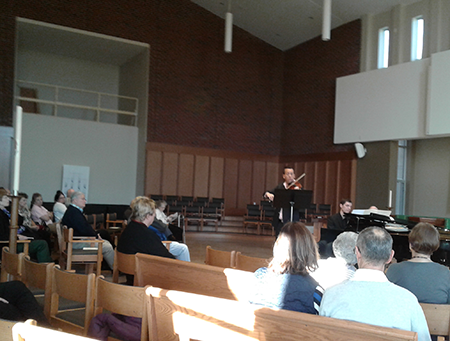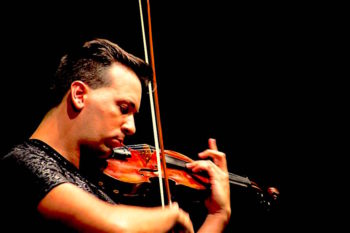by Daniel Hathaway

The new space is lofty and its acoustic lively, with lots of hard surfaces mitigated by stretches of wood and tempered by upholstered chairs. It was clear from the first piece on the program that this is a fine place to hear music, and Sunday’s 90-minute recital passed the test with a well-chosen and varied selection of works for violin and piano.
Andrew Sords likes to get right down to business. Without a pause for tuning, he joined First Lutheran’s music director Brian Wentzel in a thrilling gallop through Johannes Brahms’ Scherzo — from a collaborative sonata written in honor of Joseph Joachim.
Sords followed the Brahms with Ernest Bloch’s Baal Shem — Three Pictures of Chassidic Life, written while the composer was serving as president of the Cleveland Institute of Music in the early 1920s. Here Sords achieved a sense of expressive drama without crossing the line into violinistic self-indulgence.
A third contrasting work was Edvard Grieg’s turbulent Third Violin Sonata, written twenty years after his first two works in the genre, and apparently with a longer gestation period. It was interesting in the first half of this recital to hear a German work followed by a Swiss-Hebrew piece, followed by a Norwegian sonata that quotes national folk songs to some extent but casts a wider stylistic net. Sords and Wentzel got to the core of all three works, communicating their essense to the audience.

The stunner of the afternoon was a breathless but magnificently controlled performance of Beethoven’s “Kreutzer” Sonata (No. 9, Op. 47). The two musicians put pedal to metal and charged through the first and third movements with giddy aplomb. Taking their time with the often ornate variations of the second movement, they passed virtuosic gestures back and forth charmingly.
Not every church music director is as accomplished a pianist as an organist, but Brian Wentzel is a treasure. While working hand in glove with Andrew Sords, he put the church’s new Estonia grand piano through its paces on Sunday with admirable results.
The audience was more than amenable to an additional piece, and Sords gave them a juicy arrangement of “Giulio Caccini’s Ave Maria.” If it didn’t sound like a 16th-century aria, that’s because it was probably written by an obscure Russian guitarist in the 1970s. Though it’s the musical equivalent of “fake news,” it’s easy on the ear, and a fun way to cap off a Sunday afternoon recital.
Published on ClevelandClassical.com January 30, 2018.
Click here for a printable copy of this article



